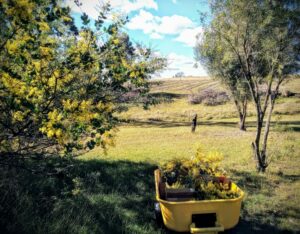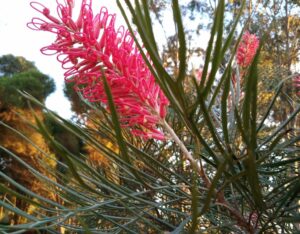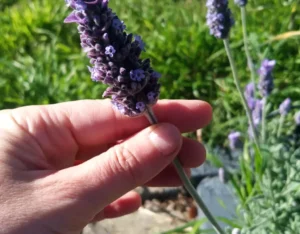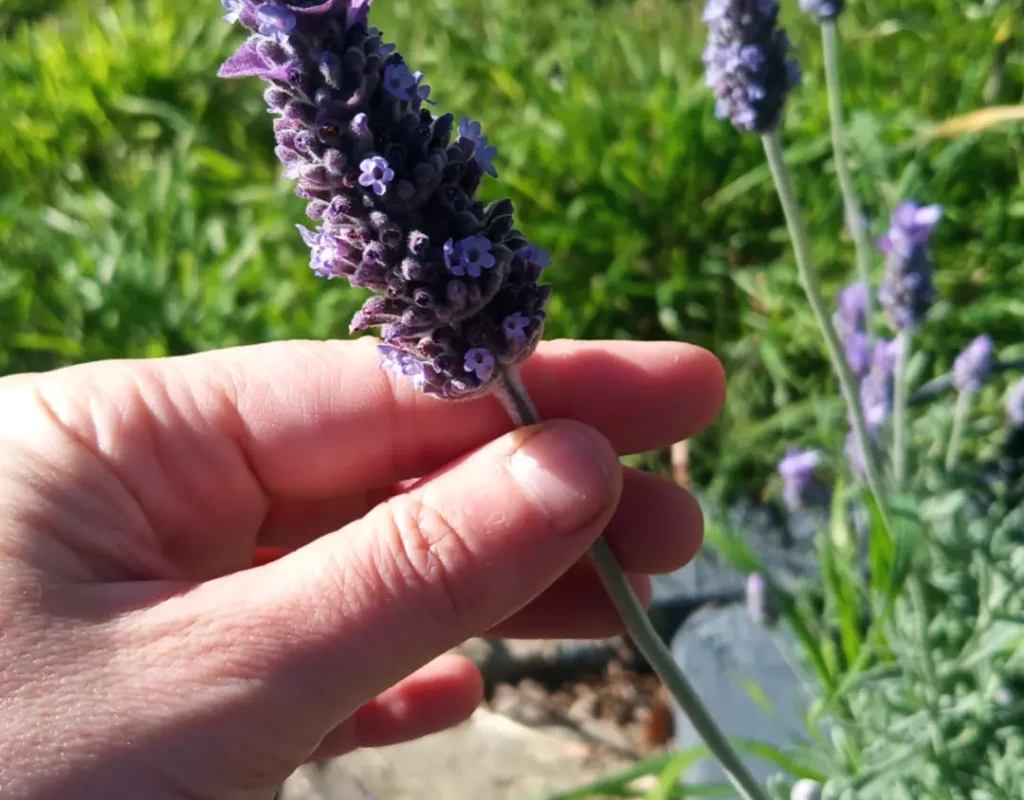Located at the beautiful Hunter Valley wine region in NSW, two hours north of Sydney, 10 minutes from Singleton town centre, is this beautiful 21-acre property owned by Karen and her family. Wine Country Lavender is their playground and escape from city life, with three acres currently planted out in lavender.
Karen and her husband Marty, joined WWOOF Australia last year, as they wanted to share their “beautiful farm, stunning location, passion about lavender, international cooking, and various sustainable farming techniques with WWOOFers who are keen to learn about farming in Australia, practice their English skills (being an English as a second language teacher host), and enjoy an Australian farming experience!”
In just over one year, Karen and Marty have gathered a staggering ten 5-star reviews from their WWOOFer guests. Their secret – presenting a clear profile of their farm, welcoming and including WWOOFers as part of the family, and clarifying their farming approach and general expectations by talking about what is to be achieved and how these goals are generally met.
Why Lavender
While an avid gardener for many years, Karen quickly realised that farming is very differing to home gardening, often due to the sheer size of the areas needing regular attention. Lavender is generally a hardy, drought tolerant perennial, but it still needs weeding, mulching, and a drink during hot dry summers. For over seven years Karen has made balms and creams for Marty’s physiotherapy/chiropractor clinic in Sydney, using lavender essential oil, so growing lavender and using their own lavender essential oil seemed like a natural next step with their move to the country.
At Wine Country Lavender, Karen and Marty focus mostly on Lavandula Angustifolia, which is lavender of culinary and medicinal grade. Some of the harvested lavender is hung in bunches for drying, then de-budded by hand, and the buds are utilised in their herbal teas and jars of culinary lavender buds. Some lavender essential oil has been distilled and used in their skincare range, with oil expected to be available for retail sale in the oncoming year.
WWOOFers are invited to join the whole process and help with all of these steps – mulching and weeding by hand is a big task but it can also be enjoyable when you have company. Farming often also includes building garden beds, improving the soil with gypsum and lime, and planting new varieties. One of the most exciting things for WWOOFers has been seeing progress through their each of their small tasks and contributions – taking ‘before’ and ‘after’ shots also helps to highlight the difference made and their accomplishment!
With so many tasks to do on farms, time is a very precious resource, and needs to be managed through priorities. Building the patience is also needed when regenerating and improving the soil, and wait for plants to grow and bloom months after the hard work was done.

Understanding different perspectives
Karen has travelled extensively by herself and likes to ensure WWOOFers are treated as she would like to be, feeling safe and supported and understanding the trust involved for both parties – the host and the volunteer. The safety of WWOOFers is a priority and they are cautioned to watch where walking (anywhere in the countryside in spring/summer) for snakes, as well as wearing gloves, long sleeves and pants to avoid skin irritations, and sun safety.
Karen finds it interesting to see the growth and change in her WWOOFers even after a one-week stay (some stay longer by arrangement). At the end of their stay Karen is sure to ask her WWOOFers ‘What have you learnt from your farming experience here?’. A young Japanese WWOOFer replied “I have learnt that I am so immature! And that I have lots to learn, and I was getting impatient with the heat and flies!”

Clear and regular communication and conversation
Karen and Marty explain to WWOOFers how on the farm they have to adjust their tasks according to the weather – “one day it might rain and we do indoor tasks, on very hot days we might start the day outdoors at 6am and wrap up by 10:30am, and then do a bit more at 6pm… and yes, on Sundays we keep going too. That’s farming!” They provide instructions on the prioritisation of tasks, farm and homestead management, as well as the usual pace and requirements, which may differ from what some WWOOFers may have experienced.
House rules are explained with reasoning, such as water education and the need to have short showers to preserve this precious resource on such a dry continent. Marty enjoys chatting about the farm, Australian slang, possible travel destinations and things to see and do.
Farm work in Australia can be a totally new experience for some WWOOFers, with the “heat and flies”, early starts, and physical work. Being open with communication is key. Karen and Marty ensure they regularly check in with WWOOFers to ensure they are feeling OK and let them know there is flexibility to leave the farm if they find farm work is not for them! For WWOOFers, knowing that they are there by choice and that if needed they can move on, gives them a sense of control and security and, although not needed so far, it opens then conversation about leaving earlier if needed. They are also encouraged to ask for instructions to be repeated if they are working on a task for the first time, or for Marty to speak a little bit slower if their English is still not up to scratch!
Being part of the family and part of the team
As well as working with WWOOFers, Karen and Marty also hang out and enjoy meals with them, enabling socialisation as a part of the family. With private bedrooms, everyone has a chance to switch off and have some ‘me time’ and relax at some point throughout the day. Strong WiFi is offered to ensure that ongoing connection with loved ones, as well as research on upcoming trips. While at Wine Country Lavender, some activities are available, such as going for walks/jog around the farm, photography of wildlife and nature, or joining a trip to town for groceries when needed. There are lots of opportunities for WWOOFers to see kangaroos in the surrounding paddocks, an exciting sight for all international visitors.

Reviews:
Zenia: Thank you Karen and Marty for this great experience!! The property is amazing and you get so see kangaroos every day! The house is beautiful, everything was very nice and clean. The food was amazing. I learned a lot about lavender and enjoyed being able to help out on the fields. The atmosphere was very nice, Karen and Marty are simply very open-minded and kind people. You can talk to them about anything and simply have a great time. I am very grateful for this experience. I love how passionate they are about what they do. I wish you all the best and hope to see you again in the future! 🙂
Gauthier: We spent a week with Karen and Marty (and Trevor). We learned a lot, working with lavender, making products, and also building the shed with Marty. They also taught us a lot about Australian culture, habits, food, … and helped us prepare the rest of our trip. Thank you for this great experience, we suggest!
Natsumi: I stayed for two and a half weeks at this farm and this experience was amazing! I enjoyed working, nice smelling of lavender, meals, nature and the life with Karen and Marty! I learnt about not only working in farm, but also Australian culture which is really interesting. They are very nice, friendly, kind and funny so that this stay was really comfortable and I could enjoy this time without being nervous! I am so grateful for all their help and this experience. Thank you so much!!!


